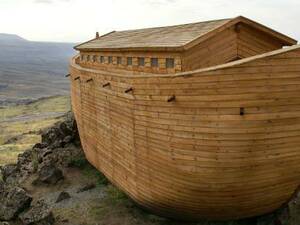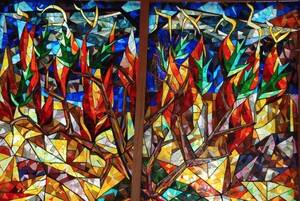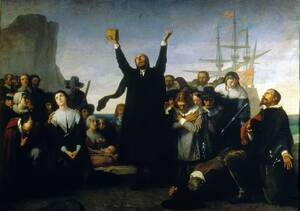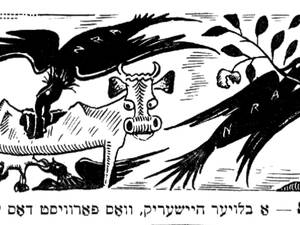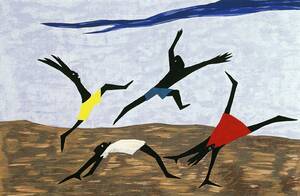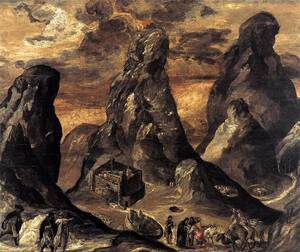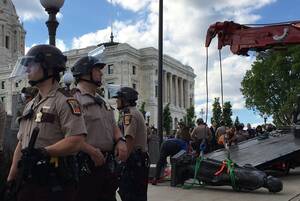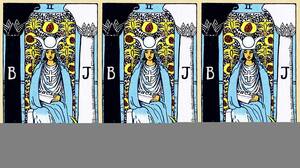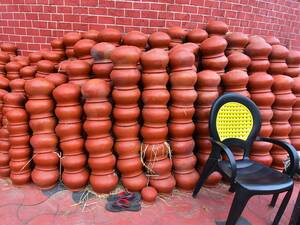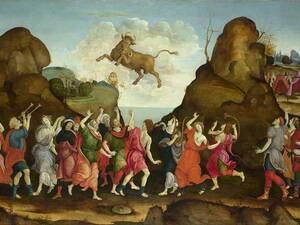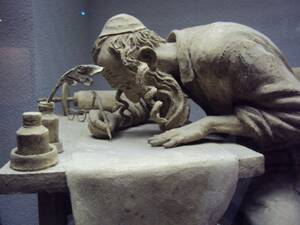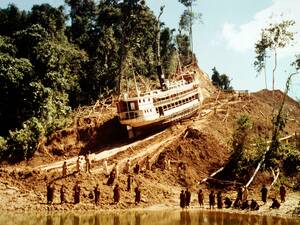Exodus: An Introduction
The Bible is long and the length of our self-isolation uncertain, so we decided to read the Book of Exodus.

WE WERE LOOKING for something long to read together during our confinement. Ari thought maybe The Magic Mountain, Thomas Mann’s novel about a tuberculosis patient convalescing in a Swiss sanatorium. Sarah suggested The Decameron, Giovanni Boccaccio’s classic work of the Black Plague, in which Florentine noblemen share raucous tales while quarantined in a villa. We reflected for a bit. “Oh yeah,” Sarah said, “I guess we should read the Bible.” She called her local bookstore to order one. They were sold out.
For the past few years, the three of us—Ari Brostoff, Sarah Chihaya, and Dan Sinykin—have periodically collaborated, along with friends and colleagues, on an annual reading series called “The Slow Burn.” Every summer, an editor for the series assembles a group of writers and critics to work their way collectively through a long text, writing each other letters as they go. Jews do something similar with the Torah, reading the five books of Moses each year, from the beginning of Genesis to the end of Deuteronomy, at the reasonable pace of one short section, or parsha, per week. Readings are held communally every Saturday, accompanied by exegesis from a congregation’s rabbi; this is the ritual that structures Shabbat services. Simchat Torah, a fall harvest holiday that comes shortly after the Jewish New Year, celebrates the conclusion of the past year’s reading cycle and the start of the new one. Judaism is, in many ways, a book club.
The Bible is long and the length of our self-isolation uncertain, so we decided to focus our quarantine edition of “The Slow Burn” on a single volume of the scriptures. We thought about the Book of Revelation, the New Testament’s iconic guide to the apocalypse, the sudden relevance of which seemed like a probable explanation for Bibles flying off shelves. Then Passover approached, a holiday in which Jews of every generation are commanded to remember the Israelites’ flight from Egypt as though they had experienced it themselves. The great imaginative distance between contemporary ritual and mythic past seemed to shorten as the seder’s allegorical dimension collapsed into the literalism of a global plague. It became obvious that it was time to read the Book of Exodus.
In his celebrated new translation of the Hebrew scriptures, the scholar Robert Alter explains that Exodus opens several hundred years after the end of its predecessor, Genesis, in a vastly expanded world. While Genesis comprises a series of “Patriarchal Tales,” character sketches and family sagas about the first Israelites, by the start of Exodus, the patriarchs’ descendants—Israelites living in exile in Egypt—“have swelled to a people.” The Egyptian Pharaoh’s murderous attempt to reverse this demographic increase instigates the volume’s plot, with its iconic story of class struggle, nation-building, the origins of law, the exhausting pursuit of freedom. Exodus, in short, is the volume in which the Jews, newly conscious of their collective destiny, become historical.
This iteration of “The Slow Burn” will be hosted here on Jewish Currents. Every Wednesday for the next 11 weeks, a different writer—one of us, or a guest contributor—will write a letter focused on one parsha of Exodus. We are using Alter’s translation of the Hebrew scriptures as a common text, though contributors are welcome to bring other versions, in any language and from any religious tradition, into the conversation. To begin with, here are our own first, brief epistles to each other, and to you.
Sarah, March 31, Brooklyn, NY:
Against all odds, isolation has restored to me some sense of childlike wonder. The internet, for example, is both bigger and smaller than I, a very old millennial, had previously understood; it seems like everyone I have ever met already knows each other there. This is obviously paltry compensation for, well, everything else. At the same time, I think it’s important to consider the fact that wonder, for children, is not always warm and sunny; as I recall, there is a primal, unreasoned terror that is inextricably woven with the simple, pleasurable discoveries of childhood. Regardless, it’s something to cling to.
Fittingly, I am a total blank slate in this project. I’m imagining myself as some kind of control group, entering with only the faintest, most unreliable prior knowledge of the Bible, courtesy of a partial reading of Milton and numerous very complete readings of Philip Pullman. So, I’ve been doing a little catch-up work, just a quick whirl through Genesis, before digging into Exodus. As it turns out, all of the stories I know from the Old Testament take place in the first 40 pages. So . . . what else happens? I find myself unironically on the edge of my seat. I also find myself credulously reinventing wheel after wheel. “Whoa,” I think, skimming Genesis 6:4, in which we meet the Nephilim, maybe-half-angelic, maybe-just-very-tall “heroes of yore.” “This age of heroes thing sounds a lot like Greek mythology!” And lo, I have rewritten The Golden Bough, James George Frazer’s dubious but influential 1890 study of comparative religion. “Gosh,” I exclaim to the cat, “God is so precise in his instructions for ark-building!” And behold, I have recommissioned all those full- and reduced-scale Noah’s ark replicas, floating (or landlocked) in locations from Kentucky to Mount Ararat to Hong Kong.
But the thing I can’t get out of my mind in this particular moment is God’s awareness, pre-Flood, that he fucked up—his quick determination to erase everything and give himself a do-over, because of how shitty humans turned out to be. In Alter’s translation, “. . . the LORD saw that the evil of the human creature was great on the earth and that every scheme of his heart’s devising was only perpetually evil” (Genesis 6:5). In the New Oxford Annotated translation, it’s “the wickedness of humankind was great in the earth,” using a preposition I find chillingly descriptive of the ongoing climate catastrophe, churning away under and over the more apparent medical and financial catastrophes of this specific moment. I find myself agreeing with God’s sentiment, though obviously not his horrific decision. The wickedness of humankind, the accumulation of capital, is great in the earth, in our soil and water and air; as God says—a phrase I never thought I’d utter—“The earth is filled with outrage.”
I have no argument here. I just feel newly gutted and wearied by this ancient claim: the earth is filled with outrage—or in alternate translations, “violence” or “lawlessness.” And I wonder what the world is going to look like, after 40-plus days of isolation in our individual arks.
Dan, April 1, Spartanburg, SC:
I envy your wonder, Sarah. My own catches me fleetingly, before it dissolves like manna at dawn. This is how Exodus describes it: “in the morning there was a layer of dew around the camp. And the layer of dew lifted, and, look, on the surface of the wilderness—stuff fine, flaky, fine as frost on the ground.” Look, we’re commanded. And for a moment I do. I’m there among the Israelites, seeing this wild thing—“it was like coriander seed, white, and its taste was like a wafer in honey”—some gentle wonder amid our pestilent spring.
But more often my readerly affect under pandemic is cynical, oriented to dark humor. Yesterday I told my partner, Masha, that I found the plagues sequence amusing. All my life I’ve read it with great solemnity. And it is solemn—horrific—if one reads it literally. But now I’m with Robert Alter when he writes, “the tone of the Plagues narrative is that of harsh (indeed, gloating) monotheistic satire against the pagan imperial power.” I imagine myself among the archaic Canaanites, hearing this tale as a brutally comic romp. Even if, by the time you reach the death of the first born, it stops being funny.
The setup for the plagues is a magic show: Moses, exiled and abject, a poor shepherd, is loitering around Sinai when a bush burns without burning up. (It’s already pretty funny that God’s in a bush.) And God’s like, “Moses, your shepherd’s staff? My friend, that’s now a magic wand, and you’re going back to Egypt”—“an international capital of the technology of magic,” Alter delightfully tells us—“to show them what real magic is.” The plagues are an escalating series of magic tricks that Pharaoh’s magicians can’t match. The humor lies in the carnivalesque upheaval, the topsy-turvy, slave-crushes-master karmic pageant, outrageously over-the-top (bring down the frogs!)—until, finally, it collapses into horror.
I was primed for biblical amusement a long time ago. My dad is Jewish and my cynicism comes, in part, from a Jewish place, a need to laugh at the absurdity of suffering—intensified now. My mother is a Lutheran pastor whose Christianity is in no small part entertaining. I went to daycare for years with a family of evangelical Christians; the father worked for the impresario evangelist Billy Graham. I once accompanied them to a laser show that culminated in archaeological proof of Noah’s ark, discovered on Ararat in modern Turkey. At a Christian teen event, I participated in a habanero eating contest and drank nearly a gallon of milk and I’ve never really been able to drink milk since. But even as my upbringing accustomed me to these spectacles and games, it was clear that some forms of trickery could not be contained within the funhouse of religious life. When I was 12, my mother confiscated my Magic: The Gathering cards, deeming them satanic. The devil, I was given to believe, performed magic; God’s supernatural interventions were coded differently, as miracles. Only now, reading Exodus, do I see the burning bush as an exemplary trick.
In Exodus, it’s fatal to address divine magic directly: tremble, avert your eyes, lose your mind. The Israelites’ threat against the Egyptians—their claim that God is on their side—turns out to be devastating for those who stand in their way. Whole peoples will be annihilated with God’s help on behalf of this incipient nation. I come back around then, Sarah, to you, and our wickedness, against which my one best spell is to crack up.
Ari, April 5, Brooklyn, NY:
Reading the beginning of Exodus, I’ve been struck by the fact that the entire story told in the Passover Haggadah, up to the parting of the Red Sea, is over by the end of the fourth parsha. Everything else, presumably, is about what happens afterward. With a mighty hand, the Lord frees the Israelites from bondage; the rest of the book, I’m hypothesizing, will be devoted to these parties going through the tumultuous courtship in which they choose each other.
As history opens up radically, I’m feeling newly able to relate to my ancient ancestors in their attempts to make sense of radical change and their willingness to make commitments because of it. I think maybe what I’ve been experiencing the past few weeks—some variation on Sarah’s sense of wonder—is “awe”? This moment has forced me into confrontation with a number of slightly embarrassing facts about my own belief system: (a) I believe in God, (b) I believe in dialectical materialism, i.e., that class struggle has (if you will) a mind of its own, (c) I’m pretty sure that—in their ability to reorder the world through the agency of previously unseen forces—these are the same thing. I feel a rickety barrier within myself breaking down, a sense of giving in to my understanding of our situation, a sense of joining up. We’ve landed in revolutionary times, and so it seems quite reasonable now to become a revolutionary. In short, I guess I’m finally a communist, and I feel a little like—oy vey, in this world there are easier things to be!
Sarah, I’m thinking about something we talked about when we first discussed doing this project: that this is a chance to read the Bible not in a religious context, but also not quite “as literature,” the way it’s taught to English majors. So: how are we reading it then? I want to say “anthropologically,” as your reinvention of The Golden Bough might indicate—but with the caveat that we don’t understand ourselves to be outside the anthropos we are studying. Part of what I mean when I say I believe in God is that I think I’m very basic: I identify with the anthropologists’ conception of humans, in which secularism doesn’t come naturally to us. By the same token, I know we’re both interested in taking seriously the collective belief—present as well as past—in the magical properties that can inhere in texts.
A few days ago, some friends (and Jewish Currents contributors), Alex Press and Gabriel Winant, started a different quarantine reading series: a podcast in which they’ll make their way through E.P. Thompson’s The Making of the English Working Class, an 850-page classic of social history. Embarking on that book in preparation to tune in, the historian Greg Afinogenov (also a Currents contributor), reflected on Twitter on an earlier, aborted attempt to read Thompson’s magnum opus. “I was so totally unequipped to appreciate its majesty when I tried to read it the first time (as a would-be historian),” he wrote, “as opposed to the second (as a historian and would-be organizer).” I think a lot of us have been in the midst of a long, slow shift from some version of “reading as would-be historians” to “reading as would-be organizers,” and I know that for me, at least, the current emergency has accelerated that process, made it feel unavoidable. I’m a perpetually frustrated, distracted reader, and I feel desperate, quite frankly, to find a new way to access the collective memory accumulated behind book covers, to make the books come back to life. Now that I need them to teach me how to do something, I wonder if they will.
We hope you will read along with us.
A zisn Pesach,
Sarah, Dan, and Ari
Ari M. Brostoff is the senior editor of Jewish Currents.
Sarah Chihaya is an assistant professor of English at Princeton University and senior editor at the Los Angeles Review of Books. She is one of four authors of The Ferrante Letters: An Experiment in Collective Criticism.
Dan Sinykin is an assistant professor of English at Emory University and the author of American Literature and the Long Downturn: Neoliberal Apocalypse (Oxford UP, 2020).
